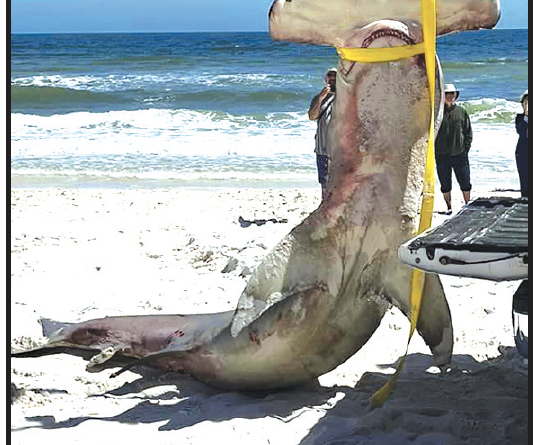Pregnant Hammerhead washes ashore in O.B.
 Pregnant Hammerhead washes ashore in O.B.
Pregnant Hammerhead washes ashore in O.B.
Staff from Orange Beach Coastal Resources, responding to an April 20 report of a dead hammerhead shark near the city’s public beach, discovered that the 14-foot shark was pregnant with 40 shark pups.
“A few individuals pulled it to shore and contacted Coastal Resources. Our staff quickly arrived and were able to get it off of the beach. While it was very sad that it passed, we were excited about the rare opportunity of seeing a Great hammerhead in such good condition. We immediately started contacting various agencies to see who had availability to come gather data from this unique specimen,’’ staff posted on facebook.
Researchers from the Mississippi State University Marine Fisheries Dept. discovered the 40 baby sharks.
The cause of death was impossible to determine, but reseachers said great hammerheads are especially prone to the physiological effects of capture stress, more so than most other shark species, and pregnancy compounds this physiological stress. They examined multiple organs and none of them had signs of trauma. The researchers believe the death was a “fishing mortality.”
The shark and all of her brood were already dead when they washed up on the beach, but vertebrae removed will be used to determine the age of the shark and its birth location. Vertebrae can also be used to examine population structure and connectivity. The shark’s stomach was empty, which is not surprising, as pregnant females often refrain from eating.
Muscle tissue from the shark will help scientists determine feeding habits and heavy metal and/or microplastic contamination. DNA extracted from the shark’s fin clips will contribute to a current MSU study examining genetic population structure.
Fin clips removed from pups combined with fin clips from the mother will be used to determine relatedness among the siblings. The broods of many shark species are sired by more than one male, a phenomenon known as “multiple paternity.” The pups themselves will be preserved and donated to local schools and the Dauphin Island Sea Lab for educational purposes.
Great hammerheads, common along the coast of Alabama, where they hunt stingrays, are not aggressive, and have never been implicated in a fatal attack.
“It is very rare to find a large pregnant female, and the data collected will be tremendously helpful in learning about Great hammerhead fecundity,’’ MSU researchers posted on facebook. “We are very thankful that our staff was able to get the shark off of the beach, protected from the elements, and iced down within a few short hours of the initial call. This was definitely an experience that we won’t forget, and we are grateful to have played a small role in this unique case.”

